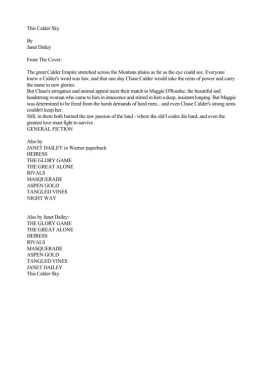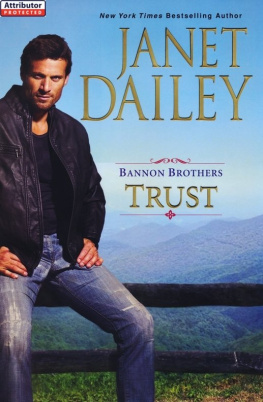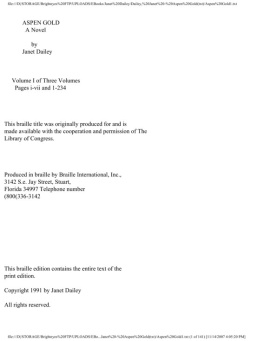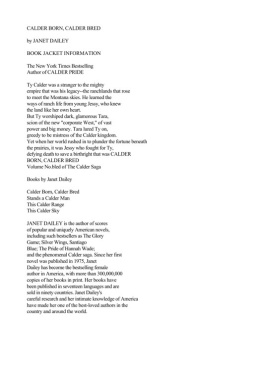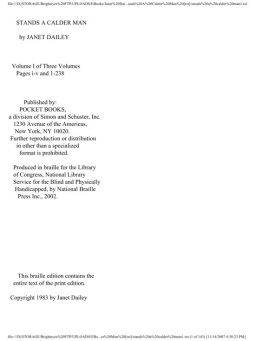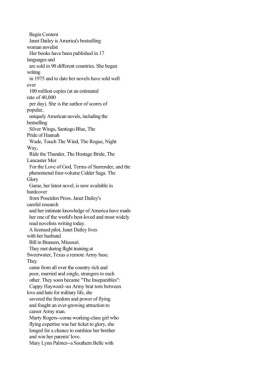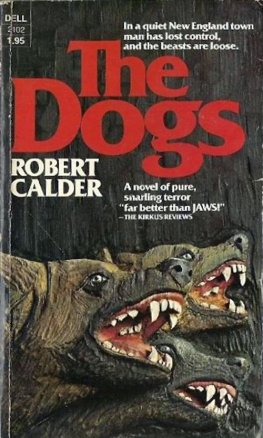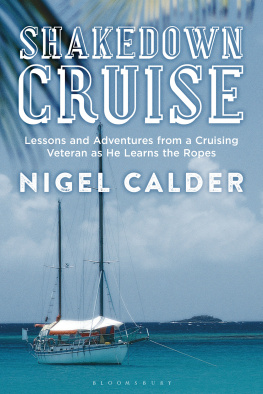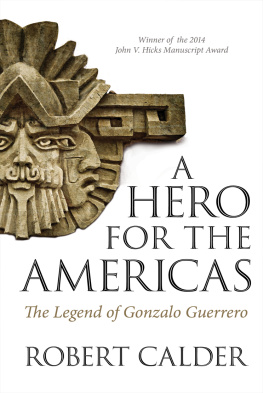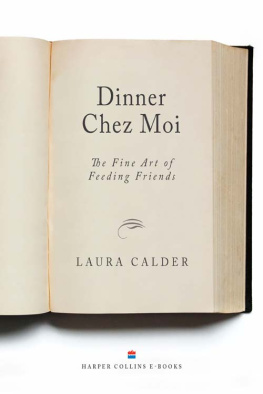This Calder Sky
By
Janet Dailey
From The Cover:
The great Calder Empire stretched across the Montana plains as far as the eye could see. Everyone knew a Calder's word was law, and that one day Chase Calder would take the reins of power and carry the name to new glories.
But Chase's arrogance and animal appeal meet their match in Maggie O'Rourke, the beautiful and headstrong woman who came to him in innocence and stirred in him a deep, insistent longing. But Maggie was determined to be freed from the harsh demands of hard men... and even Chase Calder's strong arms couldn't keep her.
Still, in them both burned the raw passion of the land - where the old I codes die hard, and even the greatest love must fight to survive
GENERAL FICTION
Also by
JANET DAILEY in Warner paperback
HEIRESS
THE GLORY GAME
THE GREAT ALONE
RIVALS
MASQUERADE
ASPEN GOLD
TANGLED VINES
NIGHT WAY
Also by Janet Dailey:
THE GLORY GAME
THE GREAT ALONE
HEIRESS
RIVALS
MASQUERADE
ASPEN GOLD
TANGLED VINES
JANET DAILEY
This Calder Sky
A Warner Book
First published in Great Britain
by Futura in 1982
Reprinted 1982 (twice)
This edition published by Warner in 1994
Copyright Janet Dailey 1981
The moral right of the author has been asserted.
All characters in this publication are fictitious
and any resemblance to real persons, living or dead,
is purely coincidental.
All rights reserved
No part of this publication may be reproduced, stored in a retrieval system, or transmitted, in any form or by any means without the prior permission in writing of the publisher, nor be otherwise circulated in any form of binding or cover other than that in which it is published and without a similar condition including this condition being imposed on the subsequent purchaser.
A GIF catalogue record for this book is available from the British Library.
ISBN o 7515 10742
Printed in England by Clays Ltd, St Ives pic
Warner Books
A Division of
Little, Brown and Company (UK)
Brettenham House
Lancaster Place
London WC2E
PART 1
A sky of sunshine; A sky of change; This sky that covers The Calder range.
Chapter I
Beneath a clear sky, the Montana plains rolled to the far horizon in an undulating sea of grass. This great, sprawling rangeland was broken by lonely buttes and wandering ravines. It was a huge, almost empty, always challenging land. Its vastness made the small man smaller and the big man king.
Where once the shaggy-maned buffalo had grazed, a herd of six hundred red-coated Hereford cattle was gathered in a pocket of the plains. Held in place by an encircling group of riders, they bawled their discontent. Into this milling confusion, cowboys working in pairs walked their horses into the herd to slowly and methodically cut out the crippled cattle - dry cows, the cows with poor spring calves, and the odd steer that had escaped the previous autumn's roundup.
Webb Calder pointed the nose of his claybank stud at the cow to be separated from the herd, then sat deep and easy in the saddle to let the horse do its work. The stallion was the color of the yellow mountain cat from which it took its name, Cougar. The instant the cow was isolated, the claybank frustrated its every attempt to rejoin the herd - getting low, coming around on a dime, and springing forward with the swiftness of a cat.
To the big-boned man in the saddle, the rangy stallion was a source of pride. He'd picked the horse out of a range-wild group of yearlings and earmarked it for his personal remuda. The breaking and training he'd done himself, turning the animal into the best cow horse on the spread. It was never something Webb Calder bragged about, and any compliment was met with the casually indifferent reply, 'The claybank is good.'
He had a philosophy that if you were the best, you
didn't have to tell anybody - and if you weren't, then you'd damned well better keep your mouth shut. He lived by it, and expected the others around him to live by it, too.
When he and the yellow horse had the cow separated from the herd, the cowboys moved in from the flanks to push the animal over the lip of the ground's pocket to where the cut of injured or inferior cattle were being held. Two more riders took his place to work the herd.
Riding back to the gather, Webb was joined by Nate Moore, who had worked the cut with him. The lank, weatherbeaten rider was one of a small corps of cowboys who had their roots dug as deep into this Montana range as Webb Calder had. Yet, some invisible quality stamped Webb Calder as the cattle owner.
For this was Calder land as far to the south as the eye could see, and beyond. All the livestock, except strays from the bordering small ranches to the north, carried the Triple C brand of the Calder Cattle Company. It was the heritage left by the first Calder who pulled up stakes in Texas and drove his herd north in 1878 to find free grass. That ancestor, Chase Benteen Calder, had carved out an empire that was measured in square miles numbering nearly six hundred. He'd held it against warring bands of renegade Indians, homesteaders, and jealously ambitious neighboring ranchers. He'd paid for it with Calder blood, nourished it with his sweat and the bones of drought-stricken cattle, and buried the Calder dead under the Montana grass.
Of the score of cowboys who had made the drive with Chase Benteen Calder, most had drifted, but a few had stayed to build a new life in this raw land. These men formed the nucleus of the group of forerunners to Nate Moore, Virg Haskell's wife, Ruth, Slim Trumbo, Ike Willis, and a handful of others, born and raised on the Calder ranch, like Webb. Their loyalty was a deep-seeded thing, ingrained into their souls as surely as if they carried the Triple C brand.
This thread of continuity ran through each generation, tying them together. The old ones eventually gave way to young blood, bringing change without ever changing.
Cresting the rise of the untamed plain, Webb reined in his horse. Satisfaction ran easy through him as he surveyed the scene before him, the teamwork of all the riders working the herd with efficient, well-oiled precision. He liked it best when he could get out among them. Although he was there out of necessity, since his decision determined which was the poorer stock to be culled from this herd, the sheer pleasure of the work made him take part in the actual cutting of the cattle.
The pressures and responsibilities were enormous and endless for the man who owned a ranch as vast as this. New salesmen or cattle buyers often commented on its size, and Webb was fond of quipping dryly,
'It takes a big chunk of ground to fit under a Calder sky.' He didn't know how it ranked against other big ranches in the country, whether it was first, second, third, or far down on the list. If anyone asked him, he couldn't have answered and he didn't care enough to check. His only interests lay in making it prosper and keeping it intact for his son.
The responsibilities were heavy, but so was the power he wielded. Webb Calder believed himself to be a fair man. There were some who would say he was exacting. And still others would claim that he ruled with an iron hand. Resentment born out of envy and jealousy made him the object of hatred from a silent few. As far as Webb Calder was concerned, he had never raised his hand against a man without cause.
When he acted, it was swift and with purpose. Indecision could eventually spell disaster for an outfit the size of the Triple C.
It was one of the things he'd tried to teach his son, Chase Calder, named after their Texan ancestor.
There was more to running a ranch than keeping books, raising cattle, and going to the bank. But how do you teach a man to be a leader, to handle men?
Next page
